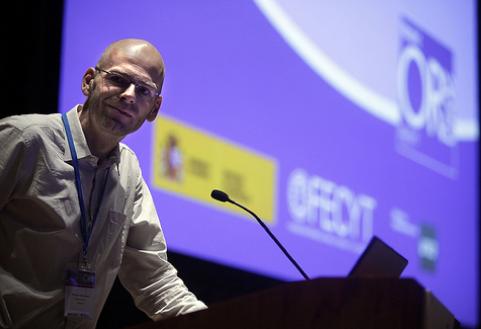Outputs
 “To make focused progress on interoperability, we need to work against a joint conceptual framework such as the DL.org Digital Library Reference Model with its core domains: Content, User, Functionality, Policy, Quality and Architecture and consider the three levels of interoperability - technical, semantic, organisational - within the DL.org Interoperability Framework.”
“To make focused progress on interoperability, we need to work against a joint conceptual framework such as the DL.org Digital Library Reference Model with its core domains: Content, User, Functionality, Policy, Quality and Architecture and consider the three levels of interoperability - technical, semantic, organisational - within the DL.org Interoperability Framework.”
Wolfram Horstmann, CIO Scholarly Information at Bielefeld University, Germany
DL.org Innovative Approach
Digital Library interoperability is a complex, mult-layered and context-specific concept that encompasses different layers along a multi-dimensional spectrum ranging from organisational to technical aspects. DL.org is the first initiative to address interoperability from the perspectives of the six core concepts charactising a Digital Library: Content, User, Functionality, Policy, Quality and Architecture. The main DL.org outputs are: Digital Library Reference Model, The Digital Library Manifesto, The Digital Library Reference Model in a Nutshell, the Conformance Check List and the Cookbook, each designed to guide and support the diverse players that face the challenges of the complex digital library universe.
Reference Modelling
Enhanced and expanded DL.org Digital Library Reference Model (April 2011) with its four parts: Manifesto, In a Nutshell, Concepts and Relations, and Conformance Check List.
The Digital Library Reference Model introduces the principles governing the digital library space, capturing the core concepts and relationships betwen them that collectively characterise this domain. The Reference Model, which comprises four equally important parts with varying layers of abstraction and concretisation. The Manifesto is the driving force behind these Digital Library Modelling Foundations, laying down the main notions characterising the Digital Library universe in rather abstract terms. The Digital Library Reference Model in a Nutshell examines these notions in more detail and with reference to the main concepts and relationships that are related to each of the aspects captured. The Reference Model Concepts and Relations is scoped to cover these concepts and relations in greater detail, explaining their rationale, as well as offering examples of their instantiation in real scenarios. The Digital Library Conformance Check List provides assessors with a set of criteria which can be used to determine whether a digital library complies with the DL.org Reference Model.
Digital Library Technology & Methodology Cookbook
The Cookbook is an innovative artefact produced by DL.org to present a portfolio of best practices and pattern solutions to common issues faced when developing large-scale interoperable digital library systems.The Cookbook proposes an interoperability framework that can be used to systematically characterise diverse facets linked to the interoperability challenge as well as existing and forthcoming solutions and approaches. The Cookbook is designed to facilitate the assessment and selection of the solutions presented.

